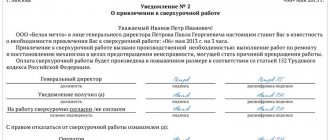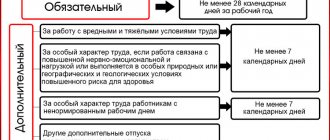05.07.2019
0
117
5 minutes.
The labor legislation of the Russian Federation guarantees the right of employees to periodic leave. However, many citizens are faced with non-compliance with the norms established by law. In such situations, in order to defend your own rights and interests, you should refer to the Labor Code of the Russian Federation. Therefore, you need to find out whether the employer can refuse leave, and in what cases it is legal.
General information
A number of articles from the Labor Code of the Russian Federation are devoted to issues regarding vacations. This regulatory document guarantees the possibility of going on vacation within a strictly established period. First of all, we should consider the basic concepts.
According to the Labor Code of the Russian Federation, vacation is a temporary period for which a citizen is released from work duties for the purpose of rest. There are several types that differ depending on their intended purpose and other aspects.
The main ones include:
- Paid annually. Provided once a year (Article 122 of the Labor Code of the Russian Federation). Compensated by the employer based on the employee’s average monthly salary. Duration – from 28 calendar days.
- Additional. Provided to employees of harmful and dangerous industries or enterprises with difficult working conditions and irregular schedules. Paid by the employer. The duration is set individually.
- Without saving salary. Provided at the request of the employee under certain circumstances. There is no maximum term limit.
- Maternity leave. Suitable for women during pregnancy. Lasts from 140 days or longer. Paid by the employer based on the average salary.
- For child care. Provided after maternity leave for up to three years of age.
Advice! To find out whether leave can be denied, you first need to determine what type of temporary cessation of work activity we are talking about. Based on the procedure for provision established by law, you can later find out whether the boss’s action is justified.
Contacting the labor inspectorate
Employees can report violations of rights to the labor inspectorate either by visiting the organization in person or through the electronic service of Rostrud. To contact inspectors virtually, you need to log in to the website (allowed through the Unified Automated Identification and Authorization System) and send an appeal, stating it in a special form.
The application requires the following information:
- information about the applicant whose rights are violated;
- information about the employer;
- link to articles of the Labor Code that are not implemented;
- other circumstances.
After considering the appeal, labor inspectors must visit the enterprise to confirm the violation or refute the information. Based on the results of the inspection, the inspector must send a certificate to the employer.
Legality of refusals
In general, if an employer does not allow vacation, this may be considered a violation. However, this rule does not always apply. Therefore, it is necessary to consider under what circumstances the refusal is lawful and complies with the norms of the Labor Code.
Legal aspects
If the employee is not allowed to go on vacation, first of all, the option of the requested vacation is taken into account. Taking this into account, it is necessary to assess whether the manager’s actions are unlawful.
It should be noted that the possibility of temporarily stopping work is guaranteed to every citizen. For example, you can go on another paid vacation once a year, in accordance with the schedule. However, the employer has the right not to give rest if this may negatively affect the work of the enterprise (Article 123 of the Labor Code). In this case, with the consent of the employee, the vacation is transferred to the next year.
As for unpaid termination of work, in this case management has more opportunities to refuse. Usually, a person is sent at his own expense only if there are compelling reasons.
Among them:
- Death of a close relative;
- Retirement age;
- Physical limitations;
- Birth of a child;
- Marriage registration.
In all other cases, the employer has the right to refuse. Therefore, to the question of whether they may not be allowed to go on vacation, they confidently answer in the affirmative.
Situations when management denies permission to go on maternity leave or sick leave are regarded as a gross violation. This is an illegal action for which liability is provided.
Possible reasons
If an employee is not allowed to go on vacation as scheduled, there must be good reason for this. There are a number of factors in which such a refusal is completely legal. These include:
- Work experience in the new place is less than 6 months;
- Violation of the vacation schedule;
- The requirement to provide another vacation with dismissal;
- Increased production demand.
Any other situations in which the employer denies scheduled leave is a violation. The employee has the right to demand compensation or file a complaint.
They may also not be allowed to go on holiday if the citizen is a civil servant, military officer, law enforcement officer or intelligence officer. However, in such cases, the refusal must be justified by the specific circumstances due to which the employee is left in place. These may include various emergency situations and the threat of natural disasters.
Solving the situation
For every citizen the relevant question is what to do if they are not given leave. The solution depends on the specific situation. Employers usually report the reasons for refusal, so that conflicts can be eliminated and the problem can be resolved in alternative ways. Among them:
- Payment of compensation. If the allotted vacation is not used, the employee may be provided with a sum of money as a kind of compensation for damage. It is calculated based on the average monthly salary. Holidays and weekends are excluded.
- Transfer of vacation. The employee, by his personal consent, changes the period of rest. This option is equally beneficial for both management and employees. Cases in which a transfer is possible are described in Article 124 of the Labor Code of the Russian Federation.
Such options are relevant provided that the employer does not allow vacation as scheduled. If you are denied leave without pay, then in this case the problem situation can only be resolved through a complaint.
Are there any violations on the part of the employer?
You need to clearly understand that from the meaning of Article 122 of the Labor Code of the Russian Federation, an employee must, by law, go on vacation every year and this vacation must be paid from the employer’s funds (vacation pay). You entered into an employment contract with your employer and worked at the company for 6 months without a break (except for weekends), then after this period you, according to the Labor Code, have the legal right to go on vacation, which must be paid. Of course, options are not excluded when an employee can go on vacation earlier without working for six months, but in this case, the employer’s permission will be required, such permission is called an agreement, it is drawn up on paper in duplicate, signed by both the employer and the employee, on the employment agreement In addition to the signatures of the parties, the seal of the organization must be affixed. After signing, the parties must each have a copy of the agreement.
Will the employer pay for weekends and holidays spent on a business trip?
Before the employee goes on vacation, the manager must warn (notify) the employee that it is soon his turn to go on annual leave and the notification should not be in words, but in paper bearing the employer’s stamp and signature. You need to know that the vacation schedule is approved for the next year at the end of the previous year, it turns out that the schedule for 2021 must be drawn up by the employer and signed by him at the end of 2017.
Money for vacation is paid to the employee 3 days before the official departure, that is, if the employee goes on vacation on June 15, vacation payments are issued on June 12.
Who must be released
There are several categories of employees who should be granted temporary leave from work, regardless of any circumstances. Otherwise, the employer faces administrative liability with penalties in the form of fines.
The following must be released:
- Employees when providing sick leave;
- Women on maternity leave;
- Persons with disabilities;
- Employees who have good reasons for going on vacation (described in Article 128 of the Labor Code).
It is important to know! In addition, an employee must be allowed to go on paid leave if he did not go on vacation last year at the request of management. Compensation or another transfer in this situation is not allowed.
What to do if they don't let you go?
But what to do if they don’t give you vacation? Before taking radical measures, you need to talk with your superiors and find peaceful ways to resolve the conflict. In case of repeated refusal, the citizen must apply for protection of his rights to the competent authorities.
Attention: Unused vacation can be reimbursed with monetary compensation only on the personal initiative of the employee and with the appropriate application.
Application to the labor inspectorate
You can contact this authority after the date written in the vacation schedule. Two identical statements should be drawn up in free form, outlining in great detail the essence of the appeal and complaint.
One copy with the inspector's visa will remain with the applicant, the second - with the inspection employee.
Documents confirming what was written must be attached to the letter.
Next, you need to send the application in any convenient way:
- hand over personally;
- send by mail with notification;
- send a request by email;
- use the online labor inspection service.
During the consideration of the complaint, the inspection commission will conduct an unscheduled inspection of the company. The inspector will determine the legality of compliance with the norms for the provision of rest in relation not only to this person, but also to the entire staff of the organization.
If violations are exposed, the employer will be given a mandatory order to eliminate the violations, and will also be held accountable in accordance with Art. 5.27 Code of Administrative Offenses of the Russian Federation. In this case, the employee will receive a long-awaited vacation.
Radical methods of getting vacation
A decisive step in resolving this issue would be to contact the prosecutor’s office with a request to conduct an unscheduled inspection of a violation of the Labor Code of the Russian Federation in a specific organization.
The application must be accompanied by documents confirming the fact that you are in an employment relationship with the employer and provide a copy of the vacation schedule. After this, you should wait for the test results.
Claim against employer
A claim is filed with the judicial authorities if an employee, in addition to vacation, wants to receive compensation from his employer. You need to compose it correctly, in legible handwriting, adhering to the correct structure.
Special cases
There are a number of specific situations when it is very difficult to understand what to do if you are not allowed to go on vacation. Therefore, it is necessary to rely on the norms prescribed in the Labor Code.
Special occasions include vacations:
- Before maternity leave. According to the law, women have the right to take another paid vacation and immediately after it go on maternity leave. But this possibility remains subject to compliance with the schedule adopted by the enterprise.
- Before leaving. The employee must notify the employee of his/her desire to leave work no later than 2 weeks in advance. Otherwise, the employer will have every right to refuse temporary termination of work.
- Part-time worker. The procedure for granting such leave does not differ from the usual one. Therefore, refusal is possible only under certain circumstances or the personal consent of the employee.
Can they not allow me to go on vacation as scheduled?
The employer does not have the right to refuse to allow an employee to go on vacation. He can only reschedule it to another date.
A prerequisite is the consent of the employee. This procedure is formalized by issuing an appropriate order at the enterprise.
You can reschedule your vacation only if you completed your last year's vacation in full. Two years without rest is a gross violation of labor legislation (Article 123 of the Labor Code of the Russian Federation).
Vacation can only be rescheduled with your personal consent.
Actions in case of violations
First of all, you need to make sure that the refusal is unlawful. If the conditions for provision are met, but leave is not given, the citizen should complain against the employer.
You can submit a claim to the following authorities:
- Labor Inspectorate of the Russian Federation at the place of work;
- Trade union organization;
- Labor Dispute Commission;
- Prosecutor's Office;
- Local court.
It is important to know! The processing time for an application depends on the specifics and workload of the service. Usually the complaint is studied for up to 30 days, after which appropriate actions are taken.
Radical measures to get leave
The most radical method to defend the right to leave is to contact not only the special labor inspectorate, but also the prosecutor's office, the court at the place of work or residence of the company manager. The basis for this may be a serious violation of the Labor Code, denial of leave for the last two years.
In the process of resolving this issue, the prosecutor is obliged to take all measures provided for by law to respond to a direct violation of labor law. As practice has shown, the employer takes appropriate measures immediately after the first call.
It is recommended that before taking this step, you carefully understand the problem that has arisen and try to understand why the manager does not want to allow you to go on vacation. Usually, if the main motives of the manager are clear, you can try to help him in resolving such an issue and still find a mutual compromise.
If permission to leave is not given, this is a serious conflict situation with a violation of labor laws.
Before taking drastic measures, it is worth trying all possible reasonable and peaceful methods. There are quite a few solutions to the problem, ranging from individual negotiations with the head of the company to the involvement of government agencies or going to court. The law is on your side and you will definitely win your case.
No content
If the reason for the time off is not valid, the employee can take time off at his own expense by submitting an application to the manager for consideration. There are categories of workers who have an unconditional right to leave without pay:
- Citizens of retirement age who continue to perform work duties (up to 14 days off without pay).
- Two weeks are given to relatives of a soldier who is undergoing military service or under a contract.
- People with disabilities while performing work duties have the right to receive an additional 2 months of unpaid leave.
Family circumstances are also grounds for granting leave without pay. It is recommended to submit the application two weeks before the expected vacation. The employer cannot refuse to provide days at the employee’s expense if the scheduled vacation has not yet been used for the current year.
Which categories of workers cannot be refused?
Pregnant woman before maternity leave
Article 260 of the Labor Code establishes that an employee has the right to take annual leave before maternity leave, after maternity leave, or after completing maternity leave. To exercise this right, a written application must be submitted to the employer.
The length of leave depends on whether the woman used her right to rest in the current year or not. If she has not yet been on vacation, or has not used it fully, then she is given a rest period equal to the remaining days.
For minor employees
Leave for an employee who has not yet reached 18 years of age must be granted outside the schedule on any date desired by the employee. In addition, the rest period is not 28 days, as for ordinary categories of workers, but 31 calendar days.
Thus, a minor is not subject to the rule of granting leave only after 6 months of work - he can write an application after a month of work and take the entire period at once, and the employer has no right to refuse him. But if he does not work the entire year, then upon dismissal from his salary it will be necessary to withhold excess amounts of vacation pay (but not more than 20% of the total payment).
Wife/husband of military personnel
The Labor Code, as well as the current law, establish that the second military spouse can take leave at the same time as the other spouse. It does not take into account whether this period of rest is provided according to the schedule or outside of it.
To receive a vacation, you must write an application to transfer the vacation period to another time and attach an available document confirming the benefit. The employer has no right to refuse such a transfer.
Single mother
The Labor Code or other legislative documents do not provide for priority rights to leave for single mothers. Thus, they must go on vacation along with other employees and according to the established schedule.
However, Art. 263 of the Labor Code of the Russian Federation establishes that if this is established by a collective agreement, then a single mother should be given a vacation period without pay for 14 days at any time convenient for her. In this case, this vacation can be provided in full or in parts.
Parents of a disabled child
This category of employees retains all standard leave rights. In addition, in 2015 an amendment was made to the Labor Code of the Russian Federation (Article 262.1). She established that such workers can receive a period of rest at their request at any time they need. They cannot be denied the right to receive paid leave.
This rule applies not only to parents, but also to guardians, adoptive parents, and guarantors. It is valid until the child turns 18 years old.
It is also necessary to remember that the legislation provides for the possibility of receiving 4 additional days of leave if a disabled child requires additional care.
Regulatory framework
The provision, schedule and duration of vacations are regulated by Chapter 19 of the Labor Code of the Russian Federation. In particular, here you can refer to the provisions of the articles:
- 114 - indicating that all employees are required to be granted vacations;
- 123 - determining the order of rest in accordance with the established schedule.
Important!
Registration of leave is a mandatory condition for compliance with labor legislation. Previously, employees exercised this right independently and could receive financial compensation instead of rest. Now every citizen who has worked for more than 12 months is required to use the next vacation within six months. Article 114 of the Labor Code of the Russian Federation “Annual paid holidays”
Article 123 of the Labor Code of the Russian Federation “The order of granting annual paid leave”










